- Home
- Mordecai Richler
Cocksure Page 4
Cocksure Read online
Page 4
“The necklace belongs to my mother,” Miss Fishman insisted over and over again.
“But,” Lord Woodcock chided her gently, “Fräulein Ringler was merely a child at the time, and so even if the necklace did once belong to your mother, a dubious possibility, then she certainly can’t be considered culpable.”
“I don’t care, I don’t care,” Miss Fishman shouted, stamping her foot childishly. “Let me at her, the German bitch. I’ll kill her.”
“German bitch?” Now Lord Woodcock, not one to lose his temper, actually raised his voice and banged his cane against the floor. “What are you?” he demanded, appalled. “A racist?”
“No.”
“A grudgy type, then?”
Thus reproached, Miss Fishman began to sob brokenly.
“I’m afraid, child, that your outburst has reminded me of nothing more than Nazi ravings, both in tone and attitude.”
“I’m unworthy,” Miss Fishman moaned.
Lord Woodcock took her arm, the one with the number tattooed on it, and began to stroke it. “It was Nazi doctrine,” he continued soothingly, “wasn’t it, to assume national guilt, to assume that it pertains equally to all individuals, and to visit upon the young the presumed sins of their elders.”
“Forgive me,” she pleaded.
“Meditate, if you will, my child, upon the fate of the Canaanites and Amalekites, and you will see that the extermination of nations is not new. I especially recommend I Samuel 15:3: ‘and spare them not; but slay both man and woman, infant and suckling.’ ” Still patting her arm he whispered, “so it is not for the Jewish people, beloved as they are to me, to cast the first stone or to judge. Is it, my child?”
Mortimer helped Miss Fishman out of her chair. “Thank you,” she said, smiling at him.
“You’re welcome,” Lord Woodcock said, and then he unlocked the office door, paused, and turned to smile beneficently on Miss Fishman, the light from behind illuminating his massive head. “Remember this too, child. Like you, Fräulein Ringler was born to die alone.”
Miss Fishman stared at Lord Woodcock’s retreating figure. “He’s a saint,” she said.
Yes, Mortimer thought, recalling his first deep conversation with Lord Woodcock. The time Mortimer had told him that when he had been with the Canadian army in Germany, immediately after the war, he had expected that they were in for a bloodbath. Mortimer had thought, he explained, that Jewish officers and men in the allied armies would run amok, shooting down Germans indiscriminately or at least hunting down former SS men and hanging them from lamp-posts, but in the western sector acts of vengeance had been scarce, Mortimer told Lord Woodcock, and he had not known of one that was Jewish-inspired.
Lord Woodcock had nodded; he had smiled. “It would not have done,” he explained, “for my Jewish brothers to respond to animal behavior with yet another obscenely animal act.”
Then he told Mortimer how after the war was done but still a festering wound, he and his followers, a number of saintly Jews among them, had traveled to Germany to demonstrate to the world how love, and only love, could conquer hatred. They had cleared the rubble from the bombed parks and filled in the shell-torn fields. They had planted acres of wheat and corn and orchards and botanical gardens, heedless of scoffing onlookers who had said nothing would grow where the old men and their students had sown. Nothing would grow, they had said, because these men, however well-intentioned, were totally lacking in agricultural acumen. Something else. They were sweetly bound by such reverence for life that they would not tolerate chemical fertilizers or sprays. But the gardens and fields and orchards bloomed, bloomed miraculously, flowers and fruit trees and wheat proliferating in such abundance that it seemed to some that God above must have blessed the seedlings. Of course the knockers said no; they rudely pointed out that underneath the meadows and parks of Germany there ran the most rare and nourishing of fertilizers – rivers of human blood and mashed bone and burned flesh. This fertilizer in fact was said to be so enduring that to this day, according to the experts, it accounted for the incomparably succulent asparagus of the Schwartzwald and the recent fecund years enjoyed by the vineyards of the Rhine, thereby bringing dividends to gourmets the world over, regardless of race, color or creed.
7
DINO TOMASSO, FAT, OILY-SKINNED, AND SHORT OF breath, disgusted Mortimer. He also astonished him. The new man, Mortimer and the other editors were told, had been flown over from Hollywood to goose Oriole’s list, regardless of the fact, Mortimer complained acrimoniously, that it was already the envy of most other London publishing houses. Tomasso, a keep-fit fanatic, did push-ups on his office carpet every morning, which was somewhat staggering, considering that his right leg, beginning above the knee, was artificial, and he was missing two fingers from his left hand. He also owned a pair of impossibly thick pebble glasses, which were always close at hand. Yet he didn’t wear them for reading. Or driving. In fact he hardly ever put them on.
Tomasso had only been with Oriole for two days when, acting on a brief prepared by the efficiency team from Frankfurt, he inaugurated a new series of books at Oriole Press: the Our Living History biographies. Then, without warning, Tomasso began to process existing staff and hire new people, applying the Star Maker’s seemingly wayward methods. This meant that Mortimer, like everyone else who worked for the Star Maker, had to submit to an exhaustive health check. Fortunately, he passed. So did Hy Rosen. But John Cameron, Oriole’s likable sales chief, was released because he had a mild heart condition. “But Cameron’s been with us for years,” Mortimer protested, outraged. “His condition doesn’t interfere with his work.”
“The Star Maker,” Tomasso said, “cannot tolerate ill health among his people.”
New staff had to undergo metabolism and blood tests, ECG’s, and other trying ordeals. Even secretaries were X-rayed and offered work based on their physical well-being, not their shorthand speed, the best positions going to those girls willing to sign an undertaking that they would undergo a hysterectomy if the management deemed it necessary. Among the new staff there was one Polly Morgan, a picture of good health. “Polly is headed for big things here,” Tomasso said, studying the doctor’s charts.
“Oh,” Mortimer said coldly.
“She is the same blood type as the Star Maker. Very rare, that.”
This made Mortimer laugh.
“You know, I’ve been with the Star Maker, Blessed Be His Name, for twenty-five years now. Started out as an assistant script editor, the coffee boy. What would you say, Griffin, if I told you that he hired me in the first place because he liked the color of my eyes?”
“You said he,” Mortimer said.
Tomasso waited, amused.
“There are rumors that – well, he’s a woman.”
“That’s all for this morning, Griffin.”
God damn it, Tomasso thought, he’ll bear watching, that one. I knew it.
Somewhat baffled, Mortimer returned to his office to brood. Actually, he was put off but not worried about Tomasso for he confidently expected that his first new project, the ill-conceived Our Living History series, would be a costly flop and thereafter, he assumed, Tomasso would depart, leaving them to muddle through as in the old days.
Mortimer and Hy, it developed, were not allowed to commission biographies for the new series, the orders had to originate in Frankfurt, which was insulting, but also advantageous: if the first two biographies – the pilots, Tomasso called them – had remaindered written all over them, they couldn’t be blamed. The first biography was of a Labour politician, once a firebrand but today a bore almost unknown to the public, and the second was of a once-well-known film star who hadn’t worked since 1945.
The first morning editorial conference called by Tomasso was stiff and formal. At the second, he introduced his idea of a Cinemagicians series; and all at once the old editorial hands looked forward to nothing so much as a conference called to consider titles for this series, if only because the puzzling, somewhat abs
tracted Polly Morgan had been put in charge.
Polly was a bewitchingly gorgeous young thing, whose every gesture, however innocently intended, was maddeningly sexy. And distracting. Not that she could be blamed, Mortimer felt, if, pondering an idea, her lips slightly parted, tapping a pencil against her teeth, she made for an untimely ache in the groin for all the men at the conference. Neither could she be legitimately reproached because discussion would suddenly falter when she was so enthused over a project as not to notice that her skirt had ridden up; a distraction compounded by the fact that Polly sat on a high art department stool and all the other editors, anticipating this excruciating delight, swiftly took to arranging themselves on sofas so that, dependent on their proclivities, Polly’s legs or adorable bottom was at eye level.
All of which, Mortimer felt, was insulting to Polly who had, to his delight, turned out to be highly skilled and most knowledgeable about films.
At a morning conference, about a week after Tomasso had come to Oriole Press, he turned from a discussion of pending Cinemagician titles to consider the manuscript of a new novel. “Who’s this kid’s editor?” he asked.
Hy beamed, his hand shooting up.
“I want to talk to you about this manuscript after lunch,” Tomasso said. “That’s all for this morning, fellas.”
Mortimer caught up with Hy in the hall. “Well,” he said, “what about lunch at The Eight Bells?”
“Not me,” Hy said, his manner truculent.
So Mortimer went on to lunch alone. Hy lingered in his office until he was certain the editorial floor had emptied and then, taking a portfolio of photographs with him, he went off in search of Polly Morgan, whom he hoped to interest in an idea of his own for the Cinemagicians series.
Polly, just as Hy had anticipated, was alone in the design department. No phones rang. No typewriters clattered. Coming up behind her, as she bent over a drawing board, Hy was concerned lest he startle her, so he coughed and said, “It’s frightfully quiet in here.”
Polly whirled around, her eyes widening. “Too quiet,” she said. “I don’t like it.”
Hy smiled and turned to set down his portfolio when suddenly Polly let out a piercing scream.
“But I’m not going to touch you. I’m Jewish.”
Polly shrieked again. “What’s the matter with you?”
Again and again she shrieked and Hy, alarmed, fled the design department and bolted out of Oriole House, across Soho Square, down Frith Street, not stopping until he reached The Eight Bells, where he instantly ordered a large brandy.
“Anything wrong?” Mortimer asked, concerned.
No, no, Hy protested, but he looked sickly and after lunch he seemed loath to return to Oriole House.
And small wonder, Mortimer reflected afterwards, for no sooner did they emerge from the lift on the editorial floor than Polly came tottering out of the design department, her lovely black hair disarrayed and her blouse ripped open, revealing a handful of white lace bra and breast.
As Mortimer stood there, aghast, Hy seemed about to flee. Which was when Polly staggered into his arms. “Without you,” she said breathlessly, “I would have been a goner for sure.”
Hy gaped.
“I feel much better now that it’s over,” Polly said, kissing him. “Do you feel better now?”
“Yes,” Hy stammered, hastily extricating himself from Polly’s embrace. “Yes, I do.”
Tomasso summoned Mortimer to his office.
“Um, we ought to get to know each other, don’t you think?”
“Surely,” Mortimer said uneasily.
“Sit down. Relax.”
Mortimer sat down. He waited.
“What brand of poison do you prefer?”
“Scotch, if you don’t mind?”
“It’s my pleasure.”
Tomasso served the drinks, but still Mortimer sat silent and unyielding. Tomasso scratched his head, searching for an icebreaker. Finally, inspired, he beamed and asked, “Getting much?”
“I beg your pardon?”
“Well, me, I’ve got the hots for Polly Morgan. Does she put out, Mort?”
“I wouldn’t know. Furthermore, if that’s why you asked me into your office –”
“Hell, no.” Tomasso bit his lip. He cracked his knuckles. “Say, what do you think of the poetry of Mao Tse-tung?”
“I wouldn’t know. I’m unfamiliar with it.”
“Me too. You see,” he said, smiling, “we have something in common after all.”
“Have we?”
“You strike me as a very human being, Mort.”
“Thank you.”
“Say, you know what the Star Maker once said to me about Senator McCarthy? He said, quote, The Senator was more than a politician. He was the most effective film critic of his time. He did more than Agee or Cahiers du Cinéma to clean the liberal hacks out of Hollywood.”
“Does that mean,” Mortimer asked indignantly, “that the Star Maker admired Senator McCarthy?”
“The Star Maker,” Tomasso said, “admires nobody, except …” He wavered.
“Yes?”
“Well, there was a certain historical figure. The Chevalier d’Éon, a French nobleman. He first turned up at court dressed as a broad, trying to steal Louis XV from Madame de Pompadour. When Louis discovered this new piece was really a drag artist he didn’t blow his top. He made the Chevalier a trusted diplomat. Once, in 1775, I think, he sent him to Russia on a secret mission disguised as a niece of his official agent. The next year the Chevalier d’Éon returned to Russia dressed as a man to finish his mission. Kinky, huh?”
“Yes.”
“One for the road?” Tomasso asked, grabbing Mortimer’s glass.
“If you like.”
While Tomasso went to refill the glasses, Mortimer, unaware that he was being watched, picked up the thick pebble spectacles on the desk and tried them. To his amazement, he discovered that they were not made of optical lenses at all. They were plain glass.
“Here’s looking at you,” Tomasso said.
“Cheers.”
As soon as Mortimer had gone, Tomasso put through a call to Frankfurt. “I want somebody to check out Griffin for me,” he said. “The complete background. You can start by getting me his army records.”
8
THE NEXT MORNING, SATURDAY, MORTIMER RECEIVED a copy of a magazine called Jewish Thought in the mail. Attached was a printed note, WITH THE COMPLIMENTS OF THE EDITOR, and underneath, penned with a lavish hand, “Respectfully, J. Shalinsky.” J. Shalinsky? J. Shalinsky’s editorial dealt searchingly with the dilemma of the Jewish artist in a philistine society. The lead article by I. M. Sinclair, M.A. (Leeds), was titled “The Anti-Semite as an Intellectual: A Study of the Novels of Graham Greene.” Another article by Lionel Gold, M.D., was titled “Diaspora IX – On Being a Reform Jew in Hampstead Garden Suburb.” There were numerous book reviews, two sentimental poems translated from the Yiddish, and a maudlin Israeli short story.
“What are you laughing at?” Joyce called out from the kitchen.
Mortimer showed her the magazine. “Don’t you find it ludicrous?”
“No.”
There was a knock at the door. “I’ll get it,” Mortimer said.
It was the lachrymose little man, the puny round-shouldered man with horn-rimmed spectacles, who was attending Mortimer’s lectures. “You got the magazine?” he asked.
“My wife. Um, Mr.…”
“Shalinsky, Jacob Shalinsky.”
“Good morning,” Joyce said. “Coffee?”
“If it’s no trouble I’d prefer a cuppa. So,” Shalinsky asked, turning to Mortimer, “what do you think?”
“I think it’s bloody presumptuous of you to show up here unannounced at this hour and –”
“No, no, no. About the magazine.”
“But it just came. I haven’t had time to look at it yet.”
“If you don’t like it all you have to do is tell me why. No evasions, please. Don�
�t beat around the bush.”
“Tea will be ready in a minute,” Joyce said.
“Ta.” Shalinsky set his homburg down on a chair.
“If there’s anything else she can get you,” Mortimer said, “just ask and –”
“Eggs would be nice. Sunny side up.”
“Look here, Shalinsky. This is not a restaurant. You can’t –”
“Mortimer,” Joyce said.
“It’s not like I came empty-handed,” Shalinsky said quickly. “I have something for you.”
Mortimer watched while Shalinsky unwrapped his parcel thinking, you can keep your Goddamn chopped liver, thank you, and I don’t want this apartment stinking of shmaltz herring. Shalinsky rolled the string into a ball and dropped it into his pocket. The brown wrapping paper, already worn and wrinkled, he folded into eight and put into another pocket. Revealed was no herring but a de luxe edition of color plates by Marc Chagall.
“It occurred to me,” he said, “that a bloke so interested in Kafka might also find beauty in the art of Marc Chagall.”
“What a lovely book, Mortimer!”
“You keep out of this.”

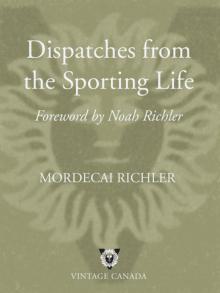 Dispatches From the Sporting Life
Dispatches From the Sporting Life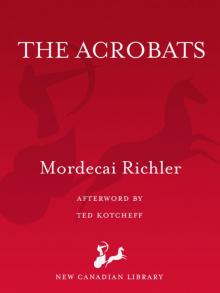 The Acrobats
The Acrobats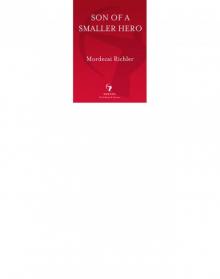 Son of a Smaller Hero
Son of a Smaller Hero Jacob Two-Two-'S First Spy Case
Jacob Two-Two-'S First Spy Case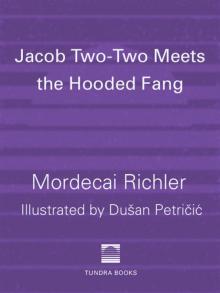 Jacob Two-Two Meets the Hooded Fang
Jacob Two-Two Meets the Hooded Fang Jacob Two-Two and the Dinosaur
Jacob Two-Two and the Dinosaur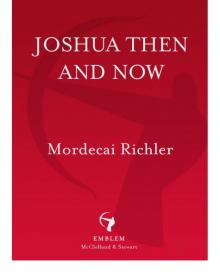 Joshua Then and Now
Joshua Then and Now Solomon Gursky Was Here
Solomon Gursky Was Here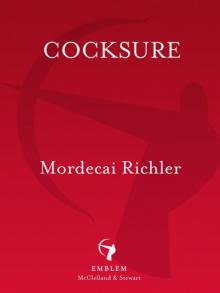 Cocksure
Cocksure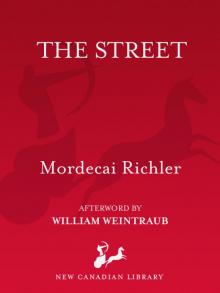 The Street
The Street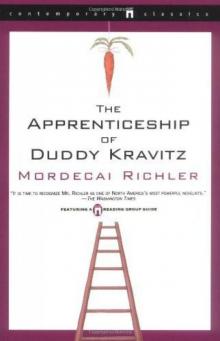 The Apprenticeship of Duddy Kravitz
The Apprenticeship of Duddy Kravitz A Choice of Enemies
A Choice of Enemies Barney's Version (Movie Tie-In Edition)
Barney's Version (Movie Tie-In Edition)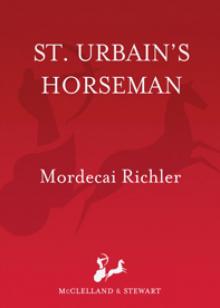 St. Urbain's Horseman
St. Urbain's Horseman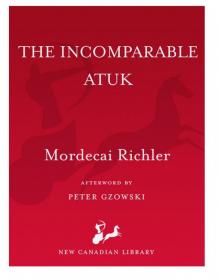 The Incomparable Atuk
The Incomparable Atuk Barney's Version
Barney's Version